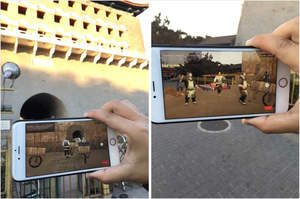BEIJING, CHINA--(Marketwired - Jan 16, 2017) - Baidu, Inc. (
In August 2016, Baidu launched an AR platform for smart phones. Leveraging this platform, Baidu has built a range of AR-based marketing and advertising solutions for the world's leading brands such as L'Oreal China, KFC China and Lancôme, providing customers with fun, interactive experiences to learn about products and offerings. In L'Oreal China's case, users can activate AR effects on shampoo bottles and interact with the images to get promotions.
"Our cell phone-based approach has enabled us to ship Augmented Reality experiences to a significant number of users in a very short amount of time," said Andrew Ng, Chief Scientist of Baidu, who heads Baidu Research, the research arm that includes AR Lab. "There is an appetite for this technology; we are seeing rapid adoption by our partners in a range of industries."
AR functionality is now available in multiple Baidu products including gateway apps Mobile Baidu, Baidu Maps and local services app Baidu Nuomi, offering hundreds of millions of users immediate access to the new AR experiences. When users search for certain keywords on Mobile Baidu, options to see AR effects related to those keywords appear on the screen.
"AR allows us to synthesize the virtual world with the real world, and will transform how all of us perceive our surroundings," said Zhongqin Wu, Head of Baidu's new AR Lab. "We've already seen rapid growth in AR marketing, and expect other industries to follow."
In conjunction with the announcement, the AR Lab has launched a project that "recreated" lost historical sites along a Beijing subway line using AR technologies. Starting today, passengers riding subway line 2 can use their smartphones to view 3D simulations of nine historical city gates of Beijing, which have either been demolished or drastically renovated.
The AR effects, which also contain other visual elements that are unique to the history of each gate, can be activated by turning on the camera function inside the Mobile Baidu app and then taking a picture of the old city gate photos inside subway stations.
Another way to activate the AR effects is by pointing the camera directly at remaining relics of the gates, which is made possible by Baidu's self-developed SLAM (Simultaneous Localization and Mapping) technology. The SLAM technology can estimate the camera pose in real environments and build 3D maps of the environment at the same time, providing more interactive experiences for smartphone-based AR.
About Baidu
Baidu, Inc. is the leading Chinese language Internet search provider. As a technology-based media company, Baidu aims to provide the best and most equitable way for people to find what they're looking for. In addition to serving individual Internet search users, Baidu provides an effective platform for businesses to reach potential customers. Baidu's ADSs trade on the NASDAQ Global Select Market under the symbol "BIDU". Currently, ten ADSs represent one Class A ordinary share.
Contact Information:
Contact Information
Leo Zou
press-baidu-usa@baidu.com
Whitney Yan
intlcomm@baidu.com
